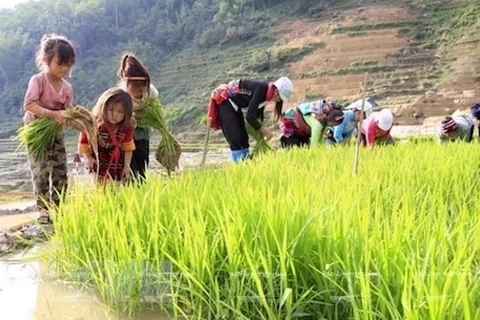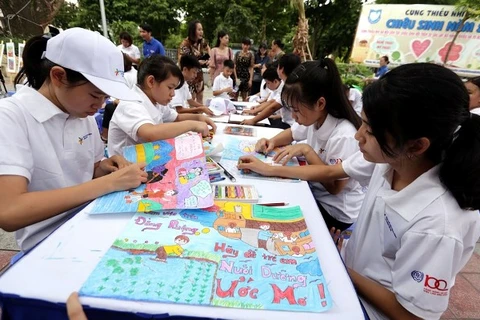Hanoi (VNA) – The National Programme on the Prevention and Reduction of Child Labour for the 2021 – 2025 period, with a vision towards 2030, was launched on December 1 to accelerate Vietnam’s progress in the fight against child labour.
Approved by the Prime Minister in Decision No.782/QD-TTg on May 27, 2021, the programme was developed and launched by the Ministry of Labour, Invalids and Social Affairs (MOLISA) in collaboration with related departments and ministries, with technical support from the International Labour Organization (ILO) and the United Nations Children Fund (UNICEF).
According to ILO estimates, by 2020, 160 million children worldwide were participating in child labour. As a result of COVID-19, this figure is predicted to increase by 8.9 million (to reach 168.9 million) by 2022.
In Vietnam, according to the results of the 2018 National Child Labour Survey, 1,031,944 children aged 5 – 17, accounting for 5.4 percent of children in this age group, were in child labour. The rate of child labour in Vietnam is almost 2 percentage points lower than the average Asia Pacific rate, and over 4 percentage points lower than the global average.
However, as global estimates suggest, unless urgent action is taken, these figures will rise as a result of the global pandemic.
With a long-term vision towards 2030, the National Programme on the Prevention and Reduction of Child Labour has three core aims: to prevent and detect cases of child labour, and support and provide interventions for children engaged in and at risk of child labour; to raise awareness on child labour prevention and reduction; and to deliver training and capacity building on child labour prevention and reduction.
The content of the programme builds on the successes and lessons learned from the implementation of the first National Child Labour Programme, implemented from 2016 - 2020.
Through the launch of the second national child labour programme, the goal is to step up these efforts, in line with Vietnam’s commitments as a pathfinder country for Global Alliance 8.7 ̶ a multi-stakeholder partnership to eliminate child labour in line with sustainable development goal (SDG) target 8.7 to eliminate child labour. As such, the upcoming programme is aligned with Vietnam’s Road Map towards SDG Target 8.7.
 A view of the launching workshop for implementation of Programme on Prevention and Reduction of Child Labour from 2021 – 2025, orientation to 2030, held in Hanoi on December 1. (Photo: VNA)
A view of the launching workshop for implementation of Programme on Prevention and Reduction of Child Labour from 2021 – 2025, orientation to 2030, held in Hanoi on December 1. (Photo: VNA)In her remarks at the event, Deputy Minister of Labours, Invalids and Social Affairs Nguyen Thi Ha emphasized that "ministries, unions, localities and organizations must actively develop plans and solutions to better prevent and reduce child labour in line with their respective responsibilities.”
ILO specialist Bharati Pflug emphasized the detrimental impacts of child labour, noting that: “Child labour not only poses reputational risks to Vietnam as an international trade partner and weakens the capacity of the future workforce of the country, it undermines the rights of children and reinforces cyclical poverty. Today’s launch demonstrates the strong political will of Vietnam’s leaders to secure a better future for future generations.”
“Vietnam has committed to comply with international labour standards, including the eradication of child labour, as required by new-generation Free Trade Agreements. The implementation of the National Programme will ensure that this commitment is applied in practice, facilitating Vietnam’s full integration into the global economy; this is crucial to the country’s economic recovery from COVID-19”, she added.
UNICEF Vietnam representative, Lesley Miller, highlighted that “child labour can be prevented through integrated approaches that simultaneously address poverty, deprivation and inequality, improve resilience and access to social protection services and quality education, and mobilize community support for respecting children's rights.
“It is also important to promote regulations on working conditions for children of working age; promote social norms and public attitudes in opposition to child labour; incorporate child labour concerns into education plans; and push the private sector and civil society to act together to eliminate child labour”, she said.
During the event, participants were introduced to the objectives and content of the programme, and provided with guidance on how to translate these aims into concrete action./.
























